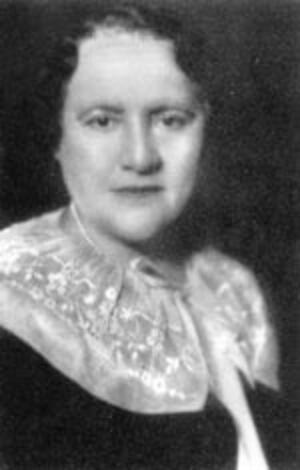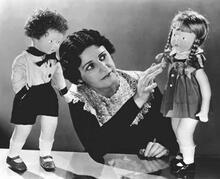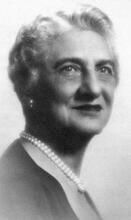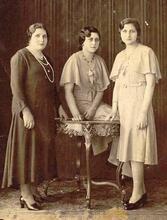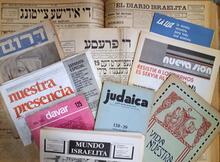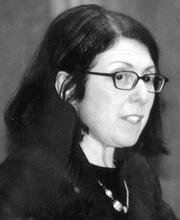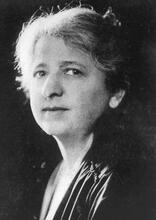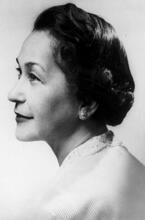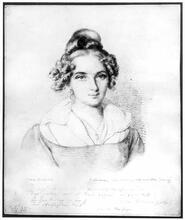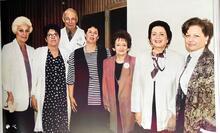Rebecca Schweitzer
Rebecca Schweitzer, international philanthropist who made key contributions to the Zionist cause.
Institution: The Jacob Rader Marcus Center of the American Jewish Archives, Cincinnati, OH, www.americanjewisharchives.org and Blackstone Studios
Rebecca Schweitzer’s generosity helped underwrite important early projects throughout Palestine and inspired others to give what they could. Born Rebecca Vera Garbovitsky in Russia, Schweitzer married Peter Schweitzer at age eighteen and immigrated to the United States in 1904. There, her husband created what became the largest importer and exporter of cigarette paper in America. The couple, both passionate Zionists, supported Hadassah to build the first hospital in Tiberias in 1921. In 1925 Schweitzer became president of the Home for the Daughters of Jacob and founding president of the New York chapter of the Palestine Lighthouse for the Blind. She also funded charitable projects in France, where several of her husband’s factories were housed, and in 1926 the French government awarded her a knighthood in the Legion of Honor.
Background and Introduction to Philanthropy
Rebecca Schweitzer had a heart as big as her pocketbook. She was born Rebecca (Rivka) Vera Garbovitsky on April 7, 1880, to Hirsch and Hannah (Levine) Garbovitsky in Crimea, Russia. Her wealthy parents provided private tutoring for their daughter. Eighteen years later, Rebecca married Peter Schweitzer in 1898, in Russia. The couple had three sons (Louis, William, and Peter) and two daughters (Sarah Grinberg and Elizabeth Licht). In 1904, the Schweitzers immigrated to the United States, where Peter created Peter J. Schweitzer, Inc. The firm eventually became the largest importer and exporter of cigarette paper in the United States. Schweitzer, Inc., had factories in Elizabeth, New Jersey, and Malaucène, France.
The success of Schweitzer, Inc. allowed the Schweitzers to become leading Jewish American philanthropists. Both Rebecca and Peter were dedicated Zionists. In 1921, they provided the initial capital of $50,000 through Hadassah to build the first hospital in Tiberias, Palestine. Nine years later, in May 1930, work was completed. The hospital was named the Peter J. Schweitzer Memorial Hospital in his memory (he had died in 1922). It wasl ater expanded and relocated to the neighboring town of Poriya.
Zionist Efforts
In addition to her support for Hadassah, Rebecca Schweitzer contributed to other Zionist organizations, including Keren Hayesod (the United Israel Appeal) when it was created in 1920 to provide all Jews with a means to further the goal of a Jewish state through monetary contributions. In 1920 the Women’s International Zionist Organization (WIZO) established an avenue for female participation in Keren Hayesod through the “Jewel Fund.” The concept was that women who were not as wealthy as Rebecca Schweitzer could donate their jewelry. Proceeds from the sale of the jewelry would be divided between Keren Hayesod (two-thirds) and WIZO (one-third). This idea eventually led to the creation of a separate women’s division involved with fund-raising campaigns. Schweitzer’s interest in Zionism extended beyond philanthropy to politics. She attended the Fourteenth World Zionist Congress in Vienna in 1925 as a delegate.
Schweitzer was also a principal shareholder in the Palestine Development Council, sponsored through money from the Jewish Colonial Trust. The Jewish Colonial Trust was created with the intention of becoming a large financial clearinghouse (bank) to back projects that would further the Zionist dream of a Jewish state.
Rebecca Schweitzer’s philanthropic work crossed international boundaries. In 1926, the French government made her a knight in the Legion of Honor; two years later, she received honorary French citizenship. Both of these acts resulted from her philanthropy in Malaucène, France. The success of Schweitzer, Inc., also probably prompted the French government to make these gestures.
After her husband’s death, beginning in 1925 Schweitzer played an integral part as president of the Home for the Daughters of Jacob. She also served as a charter member of the American Friends to the Jewish Blind of Palestine. In that year, Schweitzer organized and became the first president of the Palestine Lighthouse for the Blind’s New York City chapter.
Rebecca Schweitzer died on March 20, 1938, at Mount Sinai Hospital after an emergency operation. She was fifty-seven years old at the time of her death but had made contributions to the financial well-being of the yet unformed Israeli state that would be felt by many future generations.
AJYB 40: 391.
Obituary. NYTimes, March 21, 1938.
WWIAJ (1926, 1938).

